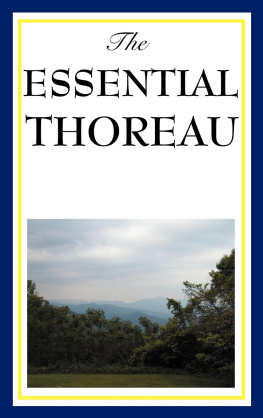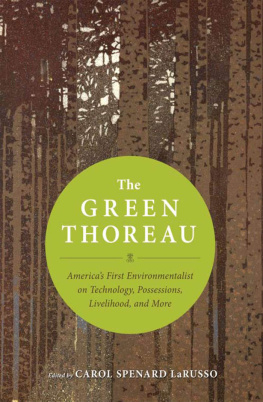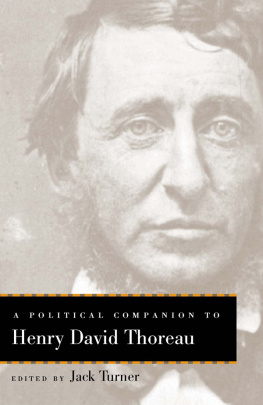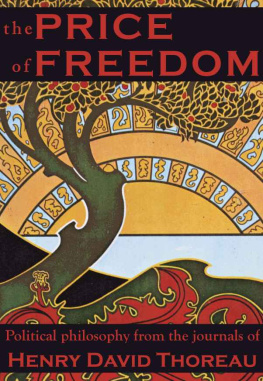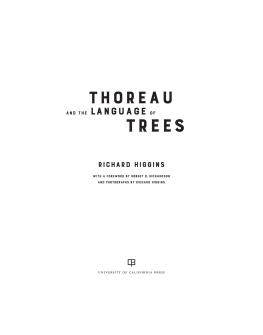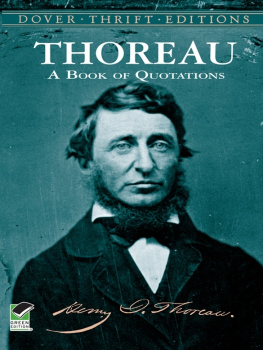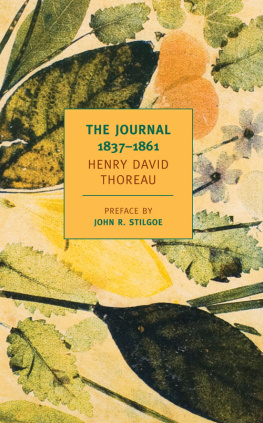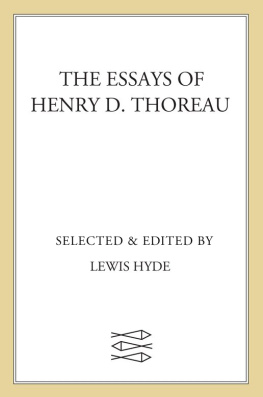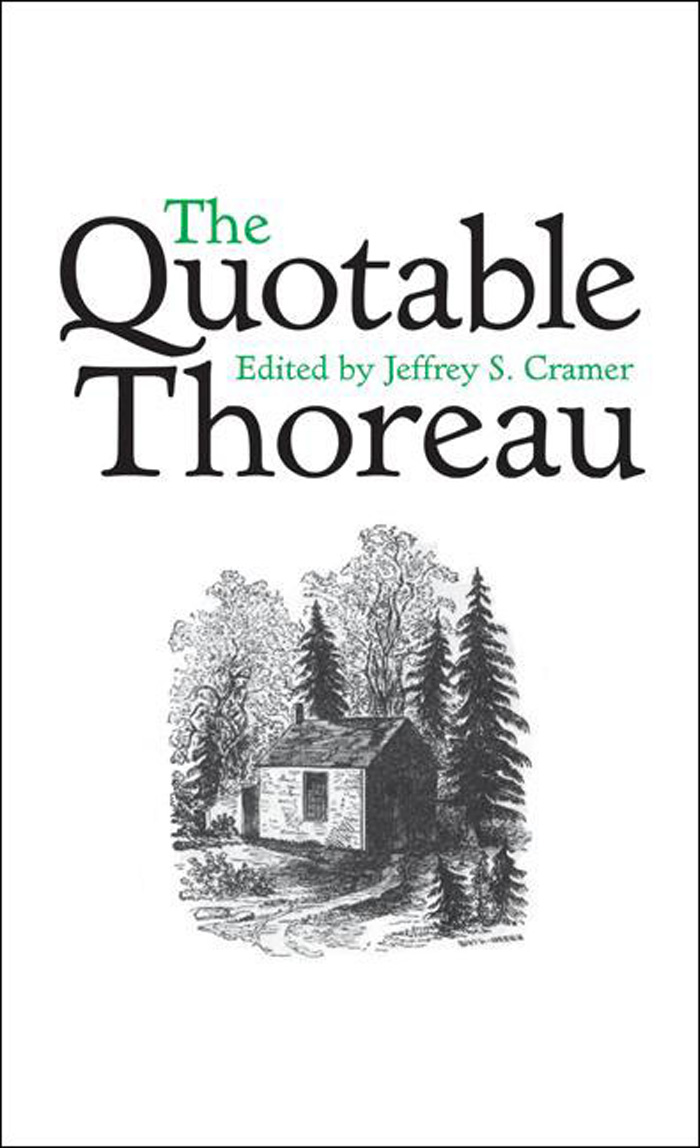The
QUOTABLE
THOREAU
The
QUOTABLE
THOREAU
Collected and Edited by Jeffrey S. Cramer
PRINCETON UNIVERSITY PRESS
PRINCETON AND OXFORD
Copyright 2011 by Princeton University Press
Published by Princeton University Press,
41 William Street, Princeton, New Jersey 08540
In the United Kingdom: Princeton University Press,
6 Oxford Street, Woodstock, Oxfordshire OX20 1TW
press.princeton.edu
Grateful acknowledgment is made to the following for permission to reproduce illustrations from their collections:
The Thoreau Society. Established in 1941, the Thoreau Society is the oldest and largest organization devoted to an American author. The Society has long contributed to the dissemination of knowledge about Thoreau by collecting books, manuscripts, and artifacts relating to Thoreau and his contemporaries, by encouraging the use of its collections at the Thoreau Institute at Walden Woods, and by publishing articles in two Society periodicals. For more information about the Thoreau Society, visit www.thoreausociety.org.
The Thoreau Institute at Walden Woods. Owned and managed by the Walden Woods Project, which preserves the land, literature and legacy of Henry David Thoreau to foster an ethic of environmental stewardship and social responsibility, the Thoreau Institute Library provides the most comprehensive body of Thoreau-related material available in one place. For more information about the Walden Woods Project, visit www.walden.org.
All Rights Reserved
Library of Congress Cataloging-in-Publication Data
Thoreau, Henry David, 18171862
The quotable Thoreau / collected and edited by Jeffrey S. Cramer.
p. cm.
Includes bibliographical references and index.
ISBN 978-0-691-13997-5 (acid-free paper) 1. Thoreau, Henry David,
18171862Quotations. I. Cramer, Jeffrey S., 1955 II. Title.
PS3042.C69 2011
818.302dc22 2010034860
British Library Cataloging-in-Publication Data is available
This book has been composed in Minion Pro
Printed on acid-free paper.
Printed in the United States of America
1 3 5 7 9 10 8 6 4 2
To Julia
What is the singing of birds, or any natural
sounds, compared with the voice of one we love?
Thoreau in his Journal, April 30, 1851
CONTENTS
AlertnessAmericaAmusementThe Animal in UsArchitectureArtAspirationAutumn LeavesAwakednessBanksBathingBeerBorrowingBoundariesCastles in the AirCircumstantial EvidenceColorCommon SenseCompensationComplimentsConformityConsistencyCriticismDeliberationDreamsEchoesEmergenciesEnthusiasmEpitaphsExaggerationFactsFameThe Family of ManFateFathersFaultGardeningGravesHasteHeaven on EarthHistoryHumorImprovementsInspirationIntegrityThe InvitationJustnessLeisureLetter WritingLibrariesLife MisspentLost and FoundMajestyMapsMarriageMemoryMiraclesMiseryMisfortuneMistakesThe Mysterious and UnexploredNamesNew DayNew YearNoveltyNudityOriginalityPatiencePraisePrayerPrejudicePreparationPresentsPrivate Property and Public LandProfanityProphets in the FamilyReputationResponsibilityRestRevengeRoadsSaving Our LivesSensesSexSizeThe Spur of the MomentSuspicionTranscendentalismUnexplored LandsVoting and ElectionsWarWeeds
Amos Bronson AlcottJohn BrownThomas CarlyleThomas De Quincey and Charles DickensMary Moody EmersonRalph Waldo EmersonNathaniel HawthorneThomas Wentworth HigginsonHenry James, Sr.Horace MannGeorge MinottWendell PhillipsDaniel WebsterWalt Whitman
Physical CharacteristicsConduct and CharacterAnecdotesDeathSome Final Assessments
PREFACE
Henry David Thoreau (18171862) is one of Americas most influential literary figures. His writings on social reform inspired Tolstoy, Gandhi, Martin Luther King, Jr., and protesters against the war in Vietnam. His natural history writings were a great impetus to John Muir and the establishment of national parks, and he is considered by many to be the father of the American environmental movement. His words in support of John Brown or against the Fugitive Slave Law are as courageous and as forthright as any written by our founding fathers, and his embodiment of the man who hears a different drummer has helped many readers pursue their own paths with independence and confidence.
The selections in The Quotable Thoreau were chosen not only to present the iconic Thoreausocial reformer, civilly disobedient citizen, environmentalist, self-reliant thinkerbut also to show the man who thought about such varied topics as food, love, God, attitude, cities, women, and everything else that fell within his scope.
In the collection that follows you will find disparate and contradictory statements on the same theme. Thoreau did not always fall clearly on any one side of a debate. His writings on civil disobedience and his writings supporting John Brown, for example, do not always seem to come from the same pen. As he wrote in his Journal on November 11, 1851, Today you may
During the selection process, several themes coalesced to become the focus of the primary topical arrangement. These major topics are arranged alphabetically. Many other themes emerged for which there were only a dozen or fewer quotations, and these have been gathered, also alphabetically, under the rubric On Miscellaneous Subjects. I let the quotations themselves dictate the categories. Many quotations easily could have been placed in more than one section, but the index ensures that these may be found according to any of the appropriate themes under whose umbrella they could have fallen. A cursory glance may reveal apparent gaps: civil disobedience, as a theme, for instance, does not appear in the table of contents. However, quotations that touch on that idea are more pertinently found under broader categories such as Higher Law or Government and Politics.
Many books of quotations are arranged in chronological order, either by date of composition or publication, within each topic. Because so many of Thoreaus writings were published posthumously, however, the date of publication oft en is not an important clue to his development as a writer or philosopher. This book proceeded instead in the spirit of Thoreau, who, when constructing a lecture or essay, would mine his journals and join previously unassociated lines from various periods into an associated whole. Thoreau did not, as he wrote, always state the facts exactly in the order Such an arrangement allowed for a deliberate positioning of a chosen line as an introductory quotation within a section or, in many cases, an end quotation that gave a sense of conclusion. One example is the section on the seasons, which benefits from a chronological arrangement of month and day, not year, to give a sense of the cycle of the seasons on which Thoreau commented.
In addition to sections in which Thoreau describes both himself and his contemporaries, and one in which he is in turn described by those who knew him, there is a section entitled Questions, which is unique to this volume. It was inspired by his statement about Emersons son, Waldo, whose questions did not admit of an answer; they were the same which you would ask yourself. Thoreau wrote in his Journal on March 6, 1840.
No compendium of quotations could satisfy every reader. Each will have his or her own special and personally relevant quotation from Thoreau. I hope that those who may find their favorite missing will discover a new and previously unknown gem to take its place.
On the death of Charles Stearns Wheeler in 1843 Thoreau wrote that although his friend did not exhibit the A love of letters and accuracy do not always go hand in hand. Following the release of the 1981 film


